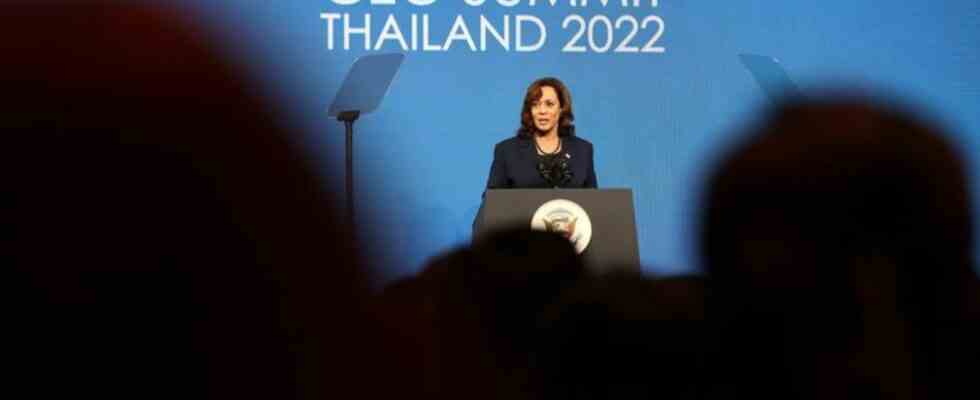Summit in Thailand
Apec majority condemns Moscow
US Vice President Kamala Harris speaks at a press conference during the APEC summit. photo
© Jack Taylor/AFP/AP/dpa
For a good week, Southeast Asia was the focus of world attention. After Bali, there is also a joint final declaration in Bangkok – and again sharp criticism of Moscow.
By sharply condemning Russia for invading Ukraine, the vast majority of heads of state and government at the Asia-Pacific Summit (APEC) in Bangkok warned of serious consequences for the global economy.
Rising inflation, disrupted supply chains and increased risks to financial stability as a result of the war have exacerbated the vulnerability of the global economy, according to a joint final statement that was adopted. However, there are also “other views and different assessments of the situation and sanctions”.
The G20 group of leading industrialized and emerging countries had already brought about a similarly worded final declaration at their summit in Bali a few days ago. After Asean in Cambodia and the G20, the series of top international meetings in Asia came to an end.
Not all Asian nations share sanctions
Russia’s aggression is shaking the “foundations of the international order,” said Japan’s Prime Minister Fumio Kishida. Against this background, it is all the more important to strengthen relations with the developing countries of Asia, Africa and Latin America in order to uphold the rules-based international order. Japan, in line with the West, has imposed sanctions on Moscow. But not all Asian nations share them.
Deputy Prime Minister Andrei Beloussov represented Russia in Bangkok instead of President Vladimir Putin. The Kremlin chief had already stayed away from the two previous ASEAN and G20 summits.
At the same time, the 21 APEC countries adopted a circular green economy concept called “Bangkok Targets,” Thailand’s Prime Minister Prayut Chan-o-cha said. This was the major goal of the host country, which wanted to see the initiative as a legacy of its APEC chairmanship. The aim is sustainable economic growth for the period after the corona pandemic. In addition, the participants spoke out in favor of free and fair trade in the Pacific region.
USA take over presidency for the coming year
The organization, founded in 1989 on Australia’s initiative, has set itself the goal of establishing a free trade zone in the Asia-Pacific region and strengthening economic growth in the member states by removing trade barriers. However, Apec resolutions are not binding, which is considered a weak point of the organization. Critics also complain that APEC has fallen behind in comparison to other regional trade agreements that have since emerged. Well over a third of the world’s population lives in the Apec States. Together, the block generates around 60 percent of global gross domestic product (GDP).
The USA took over the presidency for the coming year on Saturday. Prayut delegated leadership of the organization for 2023 to US Vice President Kamala Harris. She attended the meeting on behalf of US President Joe Biden. Harris announced that the next APEC Summit will be held in San Francisco, California, starting November 12, 2023.
Beijing hopes for better relations with the US
On the sidelines of the summit, Harris met briefly with China’s head of state and party leader Xi Jinping on Saturday. Xi expressed his hope for better relations with the US. “Hopefully, both sides will advance mutual understanding, reduce misunderstandings and miscalculations, and jointly put US-China relations on a healthy and stable course,” Chinese state television quoted the president as saying.
Harris is now traveling on to the Philippines. On Tuesday she wants to visit Puerto Princesa in the island province of Palawan in the west of the country and meet there with residents, fishermen and representatives of the Coast Guard. Palawan is located near the disputed Spratly Islands in the South China Sea. In addition to the Philippines, other states claim parts of the islands. China claims the entire archipelago for itself. According to observers, Beijing could see Harris’ visit as a provocation.
Shortly before the start of the summit on Friday, North Korea’s ruler Kim Jong Un had another ICBM fired. The allies USA, South Korea, Japan, Australia, Canada and New Zealand immediately came together in Bangkok for an emergency meeting. Kishida commented on the missile test as “absolutely unacceptable”. Apart from the states, Apec includes Brunei, Indonesia, Malaysia, the Philippines, Singapore, Thailand, Taiwan, Hong Kong, China, Mexico, Papua New Guinea, Chile, Peru, Russia and Vietnam.

